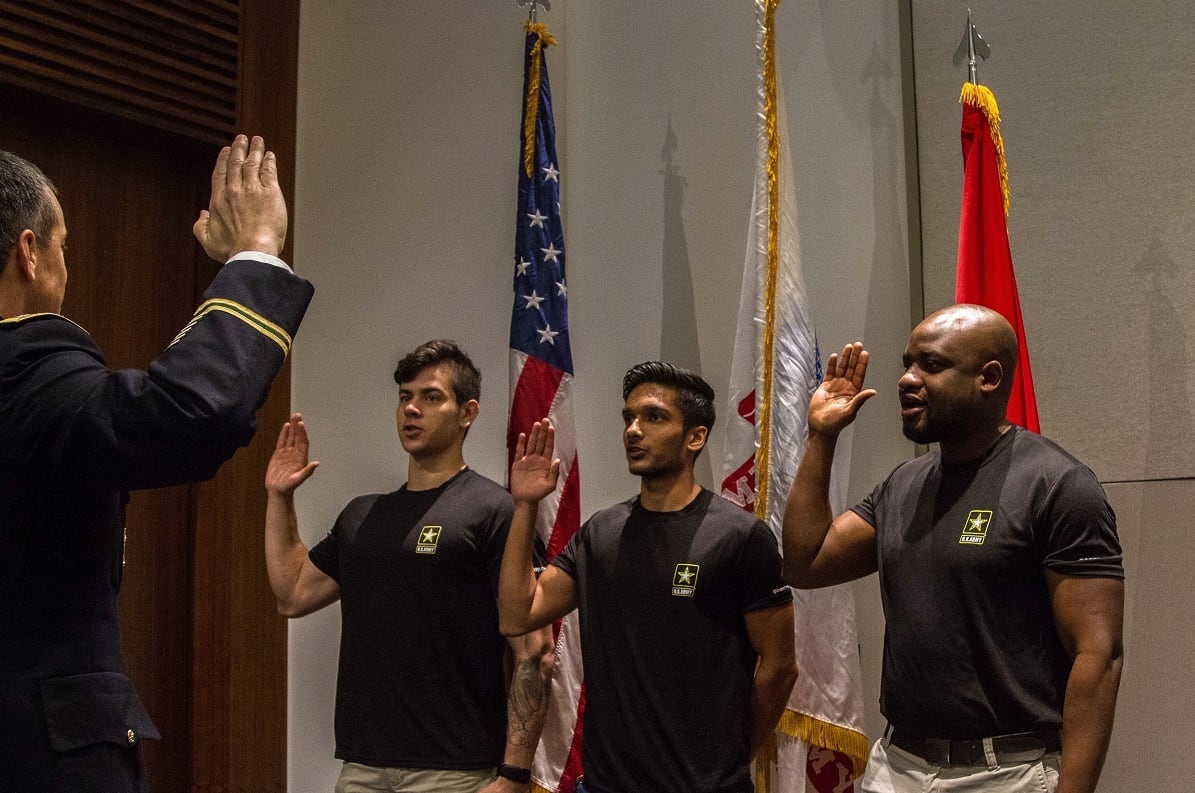Jeb Blount lives sales and teaching people to be better at the business of selling. He’s spent his career focusing his attention on services, products and expertise ― all with a people-focus.
But even he was slightly puzzled when his office staff called him to tell him about bulk orders of 50 or more of his book “Fanatical Prospecting.” Blount got curious and started making calls.
Those calls led him to visits to multiple military bases, sit-down interviews with top-level military recruiters and commanders to learn more about a culture that he’d always been around but never inside. And those visits led to his own short boot camp-style recruiting training sessions he began to deliver for military recruiters straining to make mission or simply find more and better recruits.
Military Times interviewed Blount about his recently published book, “Fanatical Military Recruiting,” the first in a planned three-part series aimed at helping military recruiters, and their bosses, reach the widest audience to find the best candidates to serve in today’s complex, fast-paced military.
Editor’s note: The following Q&A with Blount was edited for clarity, context and includes excerpts from his book.
Q: Military recruiters have always had obstacles to finding enough qualified recruits to fill the ranks of an all-volunteer force. Why do you think the book and the training you’re doing matter now?
A: Military recruiting is facing a perfect storm. Fewer people than ever before have a family member with military experience. The pool of prospects with family or geographic associations to military service is steadily evaporating. That makes it more difficult for recruiters to engage prospects and their parents.
In the midst of this, the military apparatus continues to tighten qualification standards, needing even more adept thinkers who can also meet physical standards not expected of them elsewhere. It’s no wonder so many recruiters are strolling. It’s no wonder that recruiting leaders are frustrated and more stressed out than ever.
Q: There are more than two dozen chapters in this book with tips, research and advice. But what would be at least an initial focus that recruiters and their commanders should tackle first for success?
A: Time discipline. The greatest threat to meet mission is how they use their time.
For a noncommissioned officer-in-charge, the best thing they can do is sit down and help recruiters block out their calendar. Identify specific tasks and plan the day around them. Put the most time and energy on getting prospective recruits into the “funnel” and moving that applicant through the process to get them shipped to basic training.
It’s about maintaining attention, control and focus on those activities that make that happen. Block time into small chunks and focus on those things one at a time.

When they do this, it’s transformational for recruiters. Not only does it help their numbers on the job, it helps them at home because they’re more proficient with their time and productive so they have more time at home with their family.
Q: There are a lot of platforms out there for reaching young recruiting prospects, from social media to advertising to face-to-face interactions, but you spend a lot of the book talking about a sometimes neglected technology, the phone call.
A: The military has data that would be the envy of any sales person in the industry about their target audience.
But recruiters have to be proactive in reaching as many people in that audience at possible in the most efficient way that makes a direct connection. Fewer young people make calls now than before; many text or use social media.

I was on a base doing training with recruiters. It was 0800 on a Saturday and I told them you have 15 minutes to make 15 dials. They said, ‘you’re out of your mind, nobody’s going to answer the telephone.’ Twenty minutes later they had set more appointments in 15 minutes than they had in the previous two weeks. They were stunned they got so many interviews. No one had ever picked up the phone that early in the morning to call prospects.
Young people sleep with their phones. While the phone is important, face-to-face can be tremendous. I always send recruiters in my training to get at least two contacts during a lunch break, forcing them to approach people wherever they go. They almost always bring back a number and they’re just so surprised.
Q: Last year the Army announced that it was increasing the number of recruiters it had in urban areas. Experts noted that most of the recruiting was being done in traditional rural areas, mostly in the American South.
But that’s not keeping up with the needs of the service. What might help recruiters in urban areas versus their comfortable stomping grounds?
A: This goes to getting the message out. You can’t be discouraged. Yes, you’re going to get a lot more rejection in urban areas than in rural areas because you’re a new entity. That’s true for commercial sales too.
Typically, urban residents are more skeptical because they’re always being sold to. But I have a recruiter I follow on Instagram who’s based in Manhattan, New York. He’s doing everything possible to recruit these kids. He’s on the phone, posting videos, on YouTube, going to coffee shops. He makes mission.
As a society we’ve create this gap between civilian and military. Southern states are providing more proportionately than other areas. The military has got to do a better job of selling what an amazing career the military offers. That’s an advertising, marketing thing. That does not negate the responsibility of the recruiters to go get out on the street. They’ve got to be better prospectors, better at engaging people.
It’s always going to be harder in some parts of the country. But there are recruiters in those locations making mission.
Blount’s book, “Fanatical Military Recruiting,” is available both in hardcover and as an eBook through Amazon.com and other book sellers. It is the first in a planned three-part series on military recruiting.
Todd South has written about crime, courts, government and the military for multiple publications since 2004 and was named a 2014 Pulitzer finalist for a co-written project on witness intimidation. Todd is a Marine veteran of the Iraq War.





